|
|
|
Istanbul Bank Tour
Monday, October 10 2005
setting: Old City, Istanbul, Turkey
Unlike in Jordan, the time zone in Istanbul was not off by a whole hour with respect to solar time, so the muezzin's morning call to prayer was at 5am, not 4. Interestingly, it was done in Turkish, not Arabic. To my ear it also sounded friendlier, more ecstatic, and cheerier even though it was done using the same scale and melody used in Jordan. This might reflect my bias, that Turkey, as a secular Muslim nation, has a friendlier form of Islam than the kind practiced in Jordan.
This morning Gretchen and I ate our breakfast in the outside patio area of the our hotel's restaurant. The food was sub-mediocre, at least by Middle Eastern standards, though it would have blown us away had we been in, say, the American midwest. As we ate, a couple kittens gathered around us, so we gave them bread and cheese, only the latter of which they ate. Immediately more kittens came out of the woodwork, many of them looking like color copies of individual kittens already present. So Gretchen and I took turns going inside to get pieces of greasy cold cuts for them. By the end of our breakfast we were surrounded by at least nine kittens. In defiance of a just Creator, their skill at running towards and grabbing food seemed to be in direct proportion to their lack of skinniness. The rich get richer, even among the feral street cats of Istanbul.
Our first touristy activity of the day a tour of the famous Topkapi Palace, which during Ottoman times served as the residence and office for the Sultan, his staff, concubines, their eunuch attendants, and so forth. By this point our cash flow situation was dire, as my cash card wasn't working and I didn't know my Chase card's PIN number. It was a good thing, then, when it turned out that the Topkapi Palace ticket window accepted credit cards.
The first thing we did inside the gates was get tickets to tour the Harem (a secondary expense) since such tours have to be arranged an hour and a half in advance. Once we had that taken care of, we could tour the broader palace.
The part of the palace that most impressed me was the enormous kitchen, which once had provided food for a staff of ten thousand people. Its ceilings were domes of stacked bricks topped with stout chimneys that looked like they'd been subcontracted out to the same people who slapped minarets on orthodox churches as a necessary step in converting them into mosques. Some of these domes clearly had suffered damage from past earthquakes. In general, it looks as if the risk of earthquakes wasn't well understood by the ancients and very little of the original architecture seemed to have been designed to resist lateral movements. Only in relatively recent times have such structures been installed, usually in the form of iron braces between walls and columns and spanning horizontally beneath arches. These braces are now ubiquitous in Istanbul, seen everywhere from the cistern to the Blue Mosque (though it's doubtful those four massive piers in the Blue Mosque are every going to fall). The only priceless structures in Istanbul that still seems at risk of being toppled in an earthquake are the two obelisks on the Hippodrome. I honestly don't know how they can still be standing after 1700 years in such an earthquake-prone region.
These days the kitchen is being used as a museum for the display of priceless Chinese ceramics, which were highly prized (and its patterns much-duplicated, particularly in tile) by the Ottomans. This display was fairly ho-hum to me, though I did appreciate another sub-museum in Topkapi's inner-sanctum, where all sorts of Islamic relics were on display. These included a pair of sandals worn by Mohammed, several tufts of hair supposedly from his beard, and some doors that use to hang at the entrance to the Kaaba in Mecca. There was also a threatening letter handwritten by Mohammed to the Copts of Egypt urging them to convert to Islam or else.
Out of respect for religious Muslims, these artifacts are displayed in a reverential, non-skeptical manner. And in a nearby booth is an Imam reading a sermon in Turkish. If you look over his shoulder you'll see that what he is reading is an Arabic copy of the Koran with side notes and commentary in Turkish.
Still waiting for our tour of the Harem, we ate lunch at a café inside the palace. We had so little cash on hand that we ended up splitting a sandwich. Afterwards I tried to find ways to squeeze money out of my credit card, but there were no provisions for such things within the palace itself.
Our tour of the Harem was led by little woman with a squeaky high-pitched voice. She spoke in English, though the vowels she was using were off enough from proper English ones that you had to compile a little conversion chart in the audio-processing part of your brain in order to follow her. But in some cases two words that are not normally homophones in English became homophones in her speech, such as "guard" and "god." Also, since Turkish lacks either hard or soft "th" sounds, she pronounced both of these as simply "t" as in "Tah eunechs helpt tah concubines wit tair music instruction."
The word "harem" simply means "private" in Arabic. The sultan's Harem was the private residence of the his multi-person "better half," their children, and a staff ball-less wonders called eunuchs. The sultan not only had multiple wives, he also had a number of "favorites" among the concubines. But the Harem was hardly a non-stop orgy. Concubines had to rise through the ranks of their peers to ever even see the sultan, and in the meantime they might well remain virgin (unless you include lesbian funny business). Since the concubines were considered slaves and since Christians, Jews, and Muslims are proscribed from slavery according to the Koran, most concubines came from either Africa or India. As part of their concubineship, they were taught the principles of Islam and were expected to master a musical instrument so they could entertain the Sultan. To Gretchen, the life of a Harem concubine sounded nearly ideal, so long as you weren't particularly interested in heterosexual relationships. But even if you were, you could still count on being set free upon your 30th birthday.
As for its architectural status, the Harem is a self-contained compound within the palace walls. Throughout it is decorated with fancy tiles and a number of landscapes painted directly onto the walls. Some of the tiles have broken over the years and been replaced, but those replacements don't always match the originals. Interestingly, the bathrooms in the Harem had functionally-modern (though elaborately ornamented) taps for both hot and cold water.
As we walked away from the Topkapi Palace, we cut through forested Gülhane Park. Near the bottom of the hill, a couple of horses were grazing, but they were the skinniest living horses either of us had ever seen. You could see all of their ribs and every detail of their pelvic bones. A couple policemen were approaching, and Gretchen did what she could to signal her displeasure with the horses' condition. Suffice it to say, this only confirmed our already shoddy impression for the state of animal rights in the Near East.
At this point our Turkish skills amounted to being able to speak one and a half words of this maddeningly non-Indo-European tongue. We'd yet to master "tesekkür ederim" (thank you), leaving us with just "hayir" (no), which would nonetheless prove essential on the bustling streets and in the markets.
We walked past a place along the Golden Horn were some men were using massive sledgehammers and welding equipment to disassemble an old railroad trestle. Nobody was wearing any eye protection.
South of the Galata Bridge is what amounts to Istanbul's downtown. We thought this might be the place where we'd be able to find a machine or a bank that would give us some money. But my bank card continued to be rejected (now with the message that our bank was the one doing the rejection). So that left us with just my Chase Platinum Card, whose PIN number I have never bother to learn. We tried taking it up to the teller at various banks and asking if we could get a cash advance. They all had the same useless advice: to try the cash machine. When we further re-explained the part about not having the PIN number, they'd suggest another bank, but the story there would always be the same. After we'd tried just about every bank in downtown Istanbul we had to give up and resolve to deal with the matter back at the hotel, where (at least) we had a pirated WiFi internet signal.
In an attempt to salvage what we could of the day, we headed to the world-famous Grand Bazaar, a huge covered mall of shops. In some places it nearly approximates the generic glitz of a western shopping mall, while in others it has more of the funk and claustrophobia of, say, the Muslim Quarter of Jerusalem's Old City.
By this point in the day, though, we were snapping at each other from the combined effects of low blood sugar and dwindling cash reserves. Once inside the Bazaar, we went as quickly as we could to a certain restaurant Gretchen had read about. We actually had to ask directions from one of the shopkeepers at a Belly Dancing outfit store, and he led straight to the restaurant, being sure (as Gretchen was quick to note) to stop and chat with the management afterwards so they'd be aware of the service he'd provided.
I tried to order a beer with my lunch but that was when I learned that no alcohol is permitted in the Grand Bazaar because of its close connection to one of the nearby mosques.
There's not a whole lot one can buy in the Grand Bazaar with just a credit card, but we did what we could. Attempting to buy some small ceramic bowls, we quickly learned that just because a shop has VISA and MasterCard logos in its window doesn't mean it can process a credit card.
Happily, though, the guy selling the most exquisite quilted blanket Gretchen had ever seen was able to accept credit cards, if reluctantly. Like all the other merchants, he seemed perfectly happy to unfold every blanket in his store until we saw the one we wanted.
Generally speaking it's always best in Turkey to avoid eye contact when walking past shops and street vendors. If you slip up just once and let someone catch your eye he'll pursue you singlemindedly in hopes of selling you something. It seems like a terrible waste of both your time and his, but in the end it's he who knows what he's doing. The only way to avoid such a nascent relationship is to avoid that initial glance. But this afternoon, once we'd made our purchases in the Bazaar, we must have radiated a vibe of shopped-out contentment, because the only conversation we had with shopkeepers was of the casual, non-commercial kind. As always during Ramadan, the subject quickly turns to food and they all knew to the minute when today's fast would be ending. Gretchen cheerfully told them that she's Jewish and that the Jews have to fast for 25 hours, but only once, on Yom Kippur. "But I cheat," she conceded.
Back at our hotel, Gretchen had a fruitless conversation with the hotel manager trying to get him to charge us more for our room in return for a cash advance. But he wouldn't even entertain the idea, causing the grumble about the state of the Turkish Service Industry and, particularly, its manifestation in the Turkish branch of the Best Western franchise.
We emailed Gretchen's folks to see if maybe they could Western Union us some emergency cash. And then I had an idea: maybe I could Western Union myself some money! So, over the excruciating slow connection, I set up a Western Union account and wired myself some money. But it didn't go through completely; now I was being asked to phone an 800 number to complete the transaction. There is, however, a big difference between dialing an 800 number in the United States and trying to dial one from outside of the country. Neither the Western Union number nor the number for my check card would go through. There was a service I could use for dialing such numbers internationally, but it required either a Sprint calling card or an American Express Card. But if we had an American Express Card, chances are we wouldn't be having this problem to begin with!
Luckily, the Chase card had a provision allowing us to call the bank collect from overseas, and once I'd done that their people were unexpectedly helpful. They reset the card's PIN number, though the change wouldn't manifest for 48 hours. Despite today's experience, they also told us that we should be able to get a cash advance from any bank so long as we showed up with the card and a matching passport.
Meanwhile, Gretchen's father was on the case remotely. He was in transit back to North America and couldn't wire us any money, but he kept coming up with ideas and even trying to exercise some of his international connections. In the end he managed to call our hotel and coerce the management into giving us that cash advance Gretchen had tried to negotiate earlier.
By now it was late and we'd incidentally watched a lot of bad cable television. Gretchen wanted to go out somewhere to eat, so we set off into the streets, still crazy with Ramadan fast breaking. We didn't go far, stopping at a restaurant across the street from the south end of the Blue Mosque compound. A folk musician was inside playing a lute and singing beautiful songs in that exotic and melancholy scale characteristic of the Middle East.
We sat down and ordered food, though it was so late that we were the only ones in the place still eating. Everyone else was smoking cigarettes and drinking tiny glasses of tea (evidently this place attracts a conservative crowd and no one was consuming any alcohol).
I paid close attention to the meter and sounds of the words being sung. Being Turkish, they were completely incomprehensible, of course, but I wanted to know if there was any rhyme scheme. It was hard to tell, because the stanzas would often be obscured by the singer's tendency to trail off in his delivery. Gretchen said she thought that instead of rhyming, the singer was repeating the same word, just like when Ozzy Osborne sings "Generals gathered in their masses/Just like witches at black masses."
After awhile I noticed that many of the people in the audience were singing along with the folk musician. Either he was covering well-known tunes, or he was famous for his own. Gretchen asked some youngish men nearby what the deal was, but the language barrier was too high for either to climb. In the end Gretchen's question was answered by a member of the restaurant's staff, who said the musician's name was Esat Kabaklı and that he writes his own music and has made a name for himself in Turkey. Interestingly, though, the restaurant hadn't charged a cover and didn't add one to our tab (which we successfully paid with my Chase card).
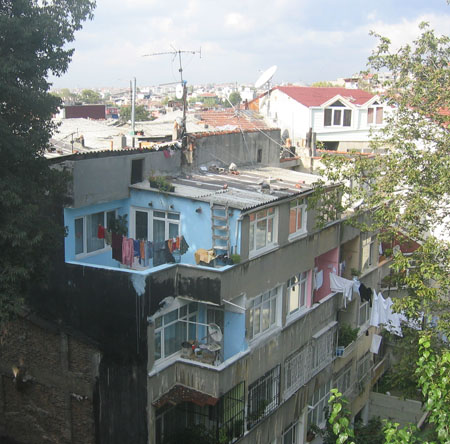
The view to the west from our hotel room. Somewhere out there is an open WiFi access point.
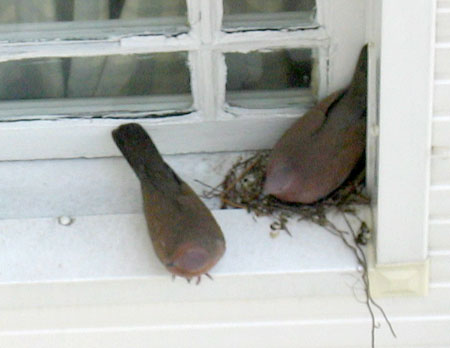
Doves on the window outside our room. They made a lot of noise. Note the vinyl siding on our 400 year old hotel.
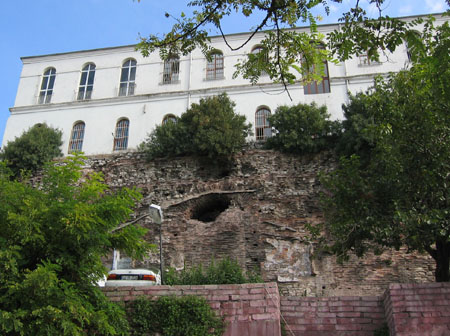
A new building atop an ancient ruin near our hotel.
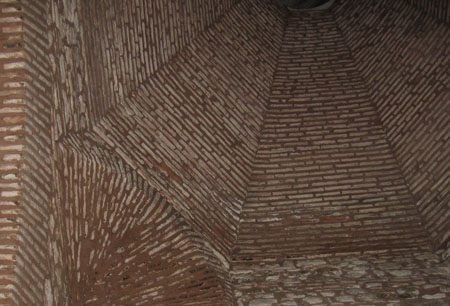
The domed brick roof of a Topkapi kitchen.
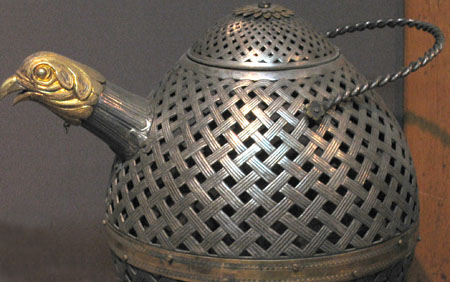
A hen teapot, presented as a diplomatic gift to one of the sultans. Displayed in one of the Topkapi museums.
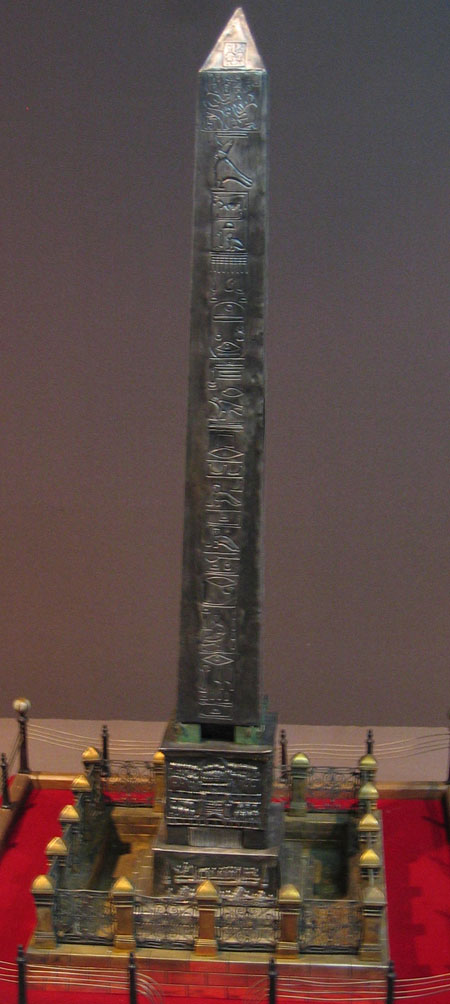
A model of the Egyptian obelisk presented as a diplomatic gift to one of the sultans. Displayed in one of the Topkapi museums.
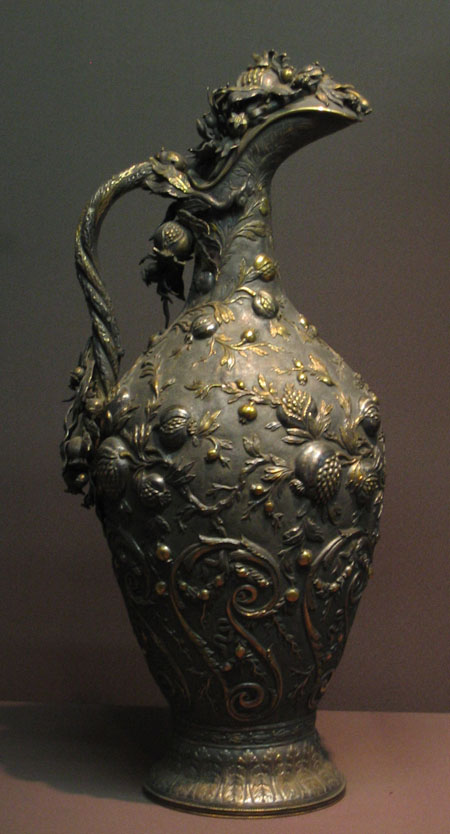
A vase presented as a diplomatic gift to one of the sultans. Displayed in one of the Topkapi museums.
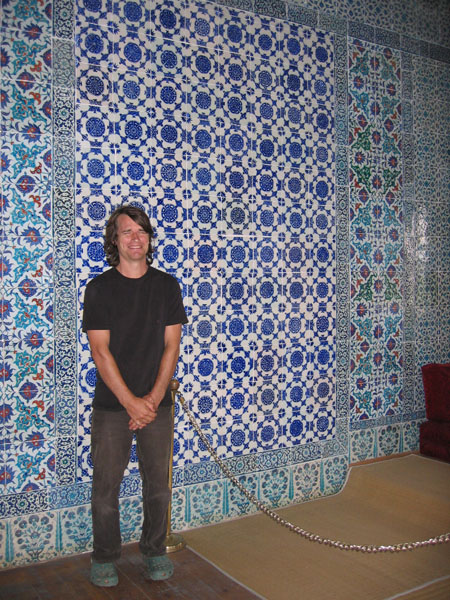
Me in the circumcision room of Topkapi Palace.
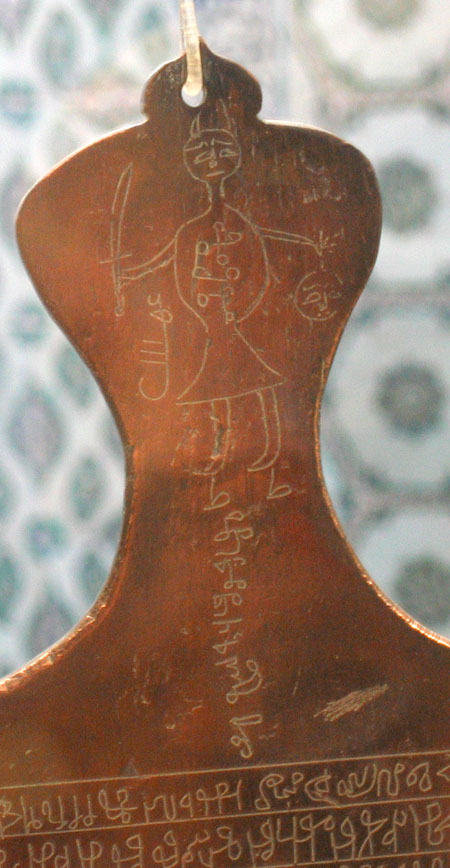
An interesting beheading devil figure on the back of a wooden object in one of Topkapi's museums.
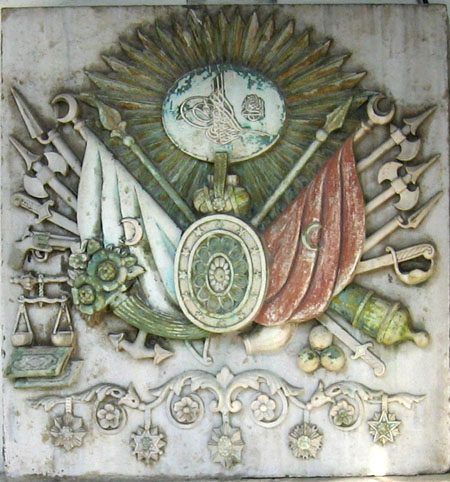
A coat of arms outside the Harem.
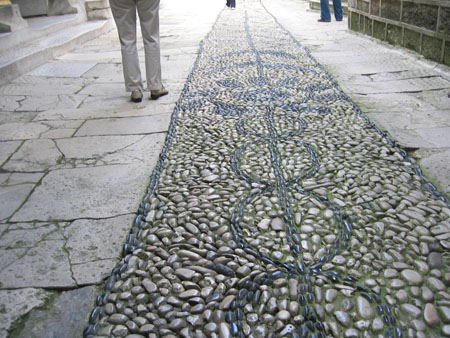
Interesting colored pebble walkway just inside the Harem gates.
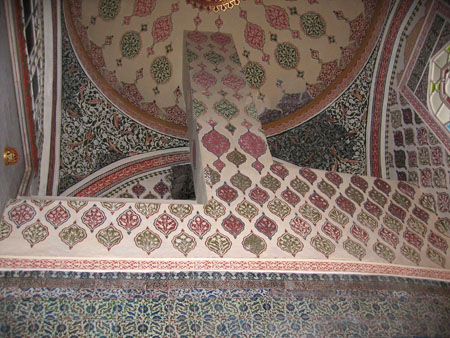
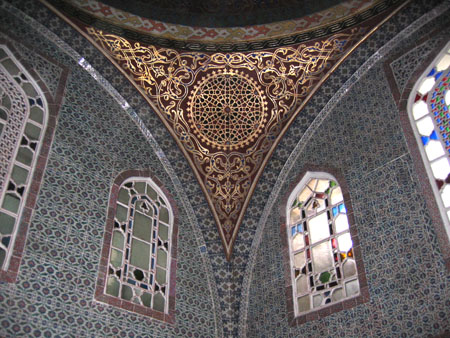
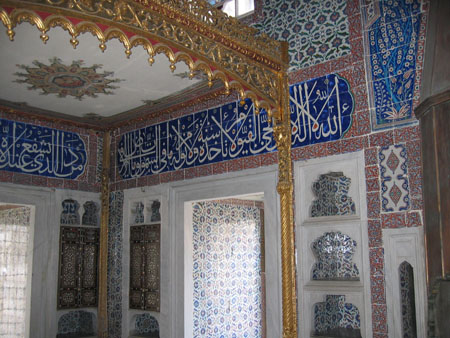
Inside the Harem.
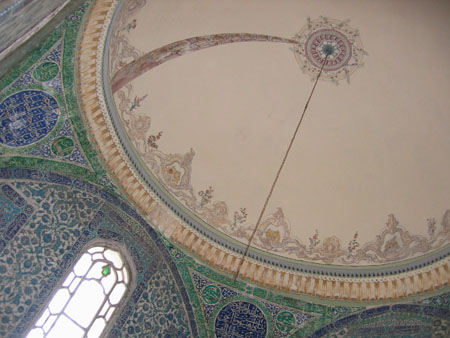
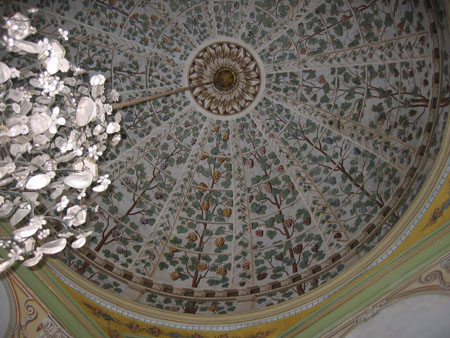
Domes in the Harem.
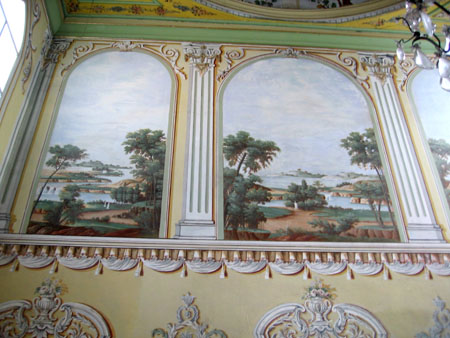
A landscape painted on a Harem wall.
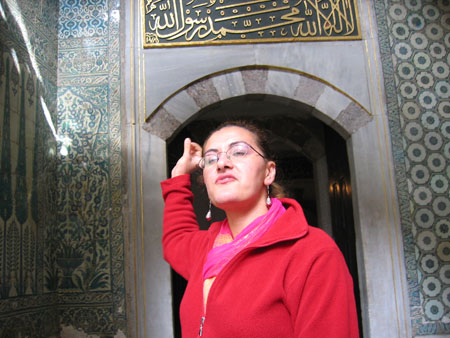
Our Harem guide busy mangling an English syllable.
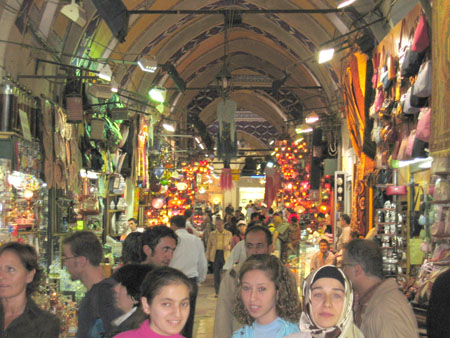
The Grand Bazaar.
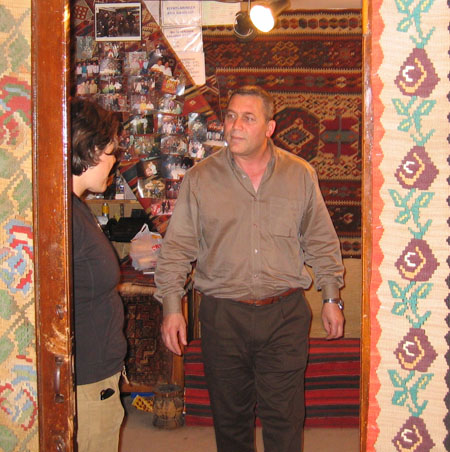
Gretchen with the blanket merchant in the Grand Bazaar.
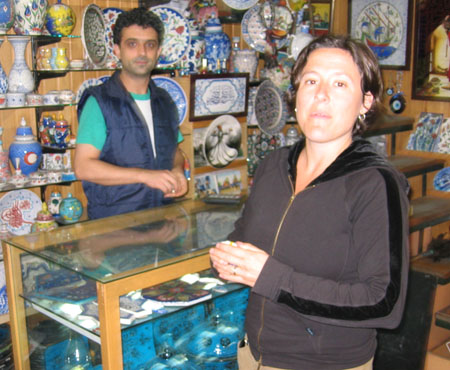
Gretchen did end up buying a single tiny bowl from the ceramic merchant for 4 ytls.
For linking purposes this article's URL is:
http://asecular.com/blog.php?051010 feedback
previous | next |




















